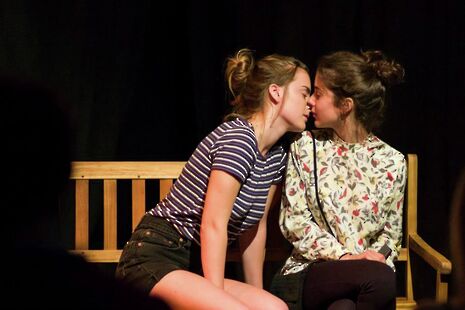Romeo and Juliet
A modern adaptation of Shakespeare’s classic romance is powerful yet divisive

Matilda Wnek and Claudia Grigg-Edo’s re-imagining of Shakespeare’s classic tragedy, Romeo and Juliet, embraces all that is great about the Fringe. Far from being a polished final product, this production is worth seeing for the marmite-like reactions that it’s sure to inspire. The lovers are taken out of the world of rivaling factions, and instead placed in an adolescent and self-absorbed universe of drugs, phones and video games. Think Shakespeare meets Skins.
A clever opening cinema scene sets up the various altered dynamics, as Romeo and Rosaline flirt over popcorn a few seats along from a happily entwined Paris and Juliet. With the dissolution of the Montague-Capulet divide, Wnek and Grigg-Edo find new conflict for the lovers in the expanded roles of Paris and Rosaline, as the play takes on an adulterous twist. As the stage becomes increasingly littered with pills, powders, cable chords and rumpled mattresses, we see the characters as a series of isolated individuals, unable to find any meaningful human connection. The real tragedy seemed to linger, not in the two bodies at the play’s conclusion, but rather in the charged silences played out with Paris and Rosaline, as they discover their lovers’ deception.
Silence plays a prominent role in this production, as the cast use their considerable combined clowning experience to great comic effect. Rosa Robson is a particular highlight, for her funny, yet affecting, take on the wooing scene. Romeo’s smooth-talking punning on lips, palmers and pilgrims becoming peppered with hesitations and awkward pauses. That said, as the play progressed, the experimentation with the breaking up of the verse sometimes led to the sense of lines being lost. The cast’s relaxed and colloquialised delivery fitted the modern aesthetic, but often at the expense of pace and energy.
As with any experimental piece, deviations from the traditional structure present a mixture of successes and failures. Removing the factional conflict of the original story, whilst allowing more room for character exploration, unfortunately turns the central romance from an assertion of free love and liberty, into a mindless affair. Shakespeare lovers should find themselves delighted and frustrated by this production in equal measure. Perhaps it’s greatest lasting success is that it cannot help but spark a conversation.
 News / SU reluctantly registers controversial women’s soc18 December 2025
News / SU reluctantly registers controversial women’s soc18 December 2025 News / CUP announces funding scheme for under-represented academics19 December 2025
News / CUP announces funding scheme for under-represented academics19 December 2025 Features / Should I stay or should I go? Cambridge students and alumni reflect on how their memories stay with them15 December 2025
Features / Should I stay or should I go? Cambridge students and alumni reflect on how their memories stay with them15 December 2025 Fashion / The art of the formal outfit 18 December 2025
Fashion / The art of the formal outfit 18 December 2025 News / Dons warn PM about Vet School closure16 December 2025
News / Dons warn PM about Vet School closure16 December 2025









